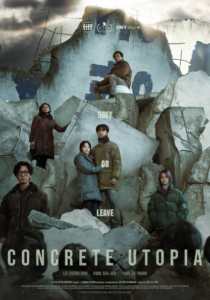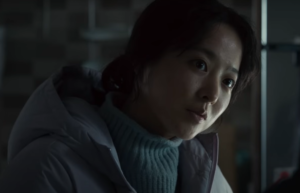
Concrete Utopia is a film partially based on the popular webtoon, Pleasant Outcast. The story takes place after a tragic earthquake that has seemingly destroyed every building aside from an apartment complex where the film mostly takes place. With supplies dwindling and no rescue team in sight, the residents of the apartment complex create a political system to help them make decisions. The gray areas of morality widen as the characters try their best for the survival of the residents. In severe cases like these, competition becomes fierce when everyone is a victim of the earthquake’s aftermath. While many other disaster films have a savior who is willing to risk their life for others, this film is instead full of ordinary people who just want to live. In short, Concrete Utopia tackles the realistic and dark reality of what humans will do for the sake of survival.
The film portrays characters who are desperate to survive, with the unsavory tendency to choose themselves over others. Even Min-seong (Park Seo-joon), the male lead character, is not your typical action hero. Oftentimes, he makes decisions by choosing his own safety. In one scene, he does try to help someone during the earthquake, but quickly realizes that he must flee. This shows that while he does have compassion, he is also practical. In another scene, Min-seong rejects a mother and child seeking shelter from the cold. Even when he is forced to share with them, he hides extra food for himself as much as possible.
The film does a good job of not painting Min-seong as a villain but rather as a human simply trying to survive. The focus on Min-seong is not because he is a hero, but because he exemplifies the general attitude of the residents of the apartment. Just like them, Min-seong wants to live even if it means leaving others behind.
Even in cases of self-defense, it is never clear if the act is heroic. For instance, in one scene a shop owner pulls a gun on Hye-won (Park Ji-hu), a young high school student. Yeong-tak (Lee Byung-hun) and Min-seong team up to successfully defend Hye-won. However, what we see afterward is an excessive use of violence towards the shop owner who was simply defending his family. The line is never clear–had they let the shop owner live, Hye-won could have died. In addition, the residents could have gone hungry that week had they also not stolen the supplies. If we look at the scene from the other end, though, the shop owner’s wife and daughter are left with an injured man and no food. It is a difficult situation that no one is prepared to navigate.
Although everyone’s will to survive is important, sometimes it is the intention that truly tells whether an act is good or not. When Yeong-tak goes to stop the fire, he openly admits that he is simply worried about the apartment falling apart. As he gains more power as the resident delegate, Yeong-tak’s ego begins to grow. While in the beginning he is insecure, he later starts to take advantage of his newfound power. Yeong-tak is willing to risk his life for the sake of the apartment, but he does not do so out of selflessness. He does so because he enjoys the glory–something he was missing before in his life.

On the other hand, we have Myeong-hwa (Park Bo-young), who was always compassionate despite the dire situation. From the beginning, she stated that she thought the best solution was to work with everyone instead of ousting the non-residents. She was even willing to give up her own space and food for others. Even after the outsiders were forced to leave, she quietly resisted by providing extra care and food for others. While her character was soft-spoken, her heroism stemmed from her empathy for others versus trying to gain a title.
At the end of the film, Myeong-hwa speaks the final line that puts into perspective the whole concept of the film. After witnessing all the deaths, it is easy to think of apartment residents as selfish and evil. However, when referring to them, Myeong-hwa simply states, “They were just ordinary people.” This statement shows that while the residents of the apartment made questionable choices, even Myeong-hwa understood that they were just humans trying to survive. Overall, that speaks to her character, and her empathy despite her disagreement with the choices that were made.
Concrete Utopia is a unique disaster film that explores the aftermath of a tragedy. This is truly a story of no heroes and no villains– just ordinary people trying to make the best choices based on what little they know. Even someone as kind-hearted as Myeong-hwa could not save everyone, and eventually had to focus on herself. While it is easy to call Yeong-tak a monster, it does not change the fact that he did save many residents of the apartment and provided them with supplies and food. The film does a good job of exploring the darkness that can emerge from people during difficult times, but Concrete Utopia also never loses sight of their humanity.
(YouTube. Images via Lotte Entertainment.)


